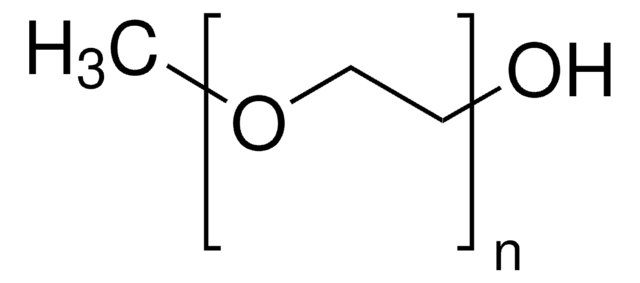85976
Methoxypolyethylene glycol succinate N-hydroxysuccinimide
5,000, ≥90%
Synonym(s):
Polyethylene glycol, mono-Methyl polyethylene glycol succinate N-succinimidyl ester, O-Methyl-O′-succinylpolyethylene glycol 5,000 N-succinimidyl ester, PEG-succinimidyl succinate
Sign Into View Organizational & Contract Pricing
All Photos(1)
About This Item
CAS Number:
MDL number:
UNSPSC Code:
12162002
PubChem Substance ID:
NACRES:
NA.25
Recommended Products
Quality Level
Assay
≥90%
form
powder
storage temp.
−20°C
InChI
1S/C11H15NO7/c13-5-6-18-7-8(14)1-4-11(17)19-12-9(15)2-3-10(12)16/h13H,1-7H2
InChI key
OVPTZXRXNNJKSJ-UHFFFAOYSA-N
Looking for similar products? Visit Product Comparison Guide
Application
- Matrix metalloproteinases-2/9-sensitive peptide-conjugated polymer micelles for site-specific release of drugs and enhancing tumor accumulation: preparation and in vitro and in vivo evaluation. This study explores the use of Methoxypolyethylene glycol succinate N-hydroxysuccinimide (MPEG-S-NHS) for creating peptide-conjugated polymer micelles that are sensitive to matrix metalloproteinases-2/9. These micelles are designed for site-specific drug release and increased tumor targeting, showcasing a promising application in advanced drug delivery systems (Zhang X, Wang X, Zhong W, Ren X, Sha X, Fang X, 2016) [link].
Linkage
Shearwater Polymers product
Storage Class Code
11 - Combustible Solids
WGK
WGK 3
Flash Point(F)
Not applicable
Flash Point(C)
Not applicable
Personal Protective Equipment
dust mask type N95 (US), Eyeshields, Gloves
Choose from one of the most recent versions:
Already Own This Product?
Find documentation for the products that you have recently purchased in the Document Library.
Customers Also Viewed
H Matsuyama et al.
Biological & pharmaceutical bulletin, 16(2), 107-111 (1993-02-01)
Purified sphingomyelinase of Streptomyces A9107 (NRRL 15100) was modified with ss-PEG, methoxypolyethyleneglycol succinimidyl succinate, without loss of activity toward sphingomyelin in the mixed micelles with detergents such as sodium deoxycholate and Triton X-100 or toward a water-soluble, synthetic substrate, HNP
M S Hershfield et al.
Proceedings of the National Academy of Sciences of the United States of America, 88(16), 7185-7189 (1991-08-15)
Modification by covalent attachment of polyethylene glycol (PEG) can reduce the immunogenicity and prolong the circulating life of proteins, but the utility of this approach for any protein is restricted by the number and distribution of PEG attachment sites (e.g.
M A Croyle et al.
Journal of virology, 75(10), 4792-4801 (2001-04-20)
Most of the early gene therapy trials for cystic fibrosis have been with adenovirus vectors. First-generation viruses with E1a and E1b deleted are limited by transient expression of the transgene and substantial inflammatory responses. Gene transfer is also significantly curtailed
H Matsuyama et al.
Chemical & pharmaceutical bulletin, 39(3), 743-746 (1991-03-01)
Phospholipase D from Streptomyces sp. AA586, PLDP, was modified with methoxypolyethylene glycol succinimidylsuccinate (ss-PEG), an active derivative of polyethylene glycol. By titration with trinitrobenzene sulfonate (TNBS), approximately 70% of the free amino groups in the enzyme protein were shown to
G Sirokmán et al.
Protein science : a publication of the Protein Society, 2(7), 1161-1170 (1993-07-01)
Bacteriorhodopsin (BR), from the purple membrane (PM) of Halobacterium halobium, was chemically modified with methoxypolyethylene glycol (m-PEG; molecular weight = 5,000 Da) succinimidyl carbonate. The polyethylene glycol-bacteriorhodopsin (m-PEG-SC-BR33) conjugate, containing one polyethylene glycol chain, was water soluble. The secondary structure
Our team of scientists has experience in all areas of research including Life Science, Material Science, Chemical Synthesis, Chromatography, Analytical and many others.
Contact Technical Service

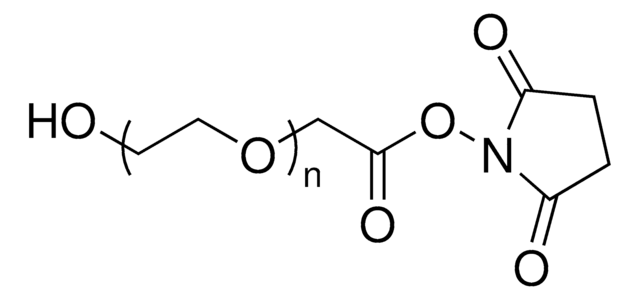
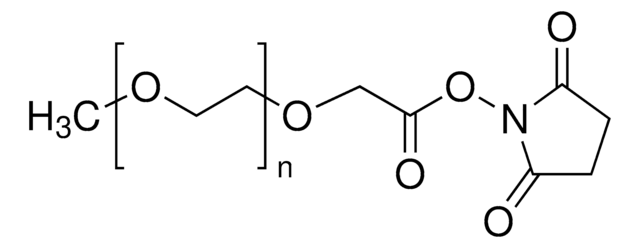
![O-[(N-Succinimidyl)succinyl-aminoethyl]-O′-methylpolyethylene glycol 2′000](/deepweb/assets/sigmaaldrich/product/structures/426/156/518cf3f3-8b50-4c91-8501-929224a040d2/640/518cf3f3-8b50-4c91-8501-929224a040d2.png)
![O-[(N-Succinimidyl)succinyl-aminoethyl]-O′-methylpolyethylene glycol average Mn 750](/deepweb/assets/sigmaaldrich/product/structures/244/886/c80fd8d8-9a62-4a97-be17-32d83ffd1dfb/640/c80fd8d8-9a62-4a97-be17-32d83ffd1dfb.png)
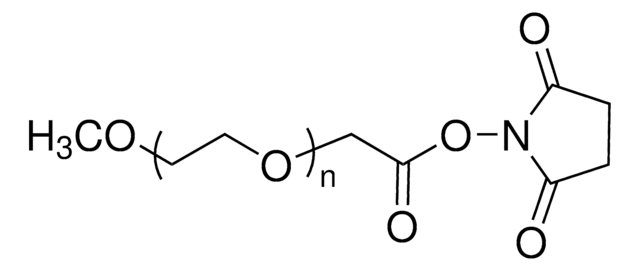
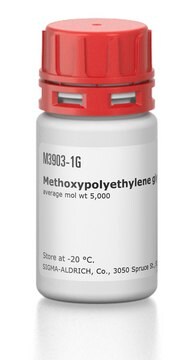

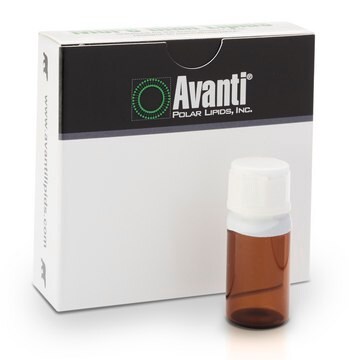
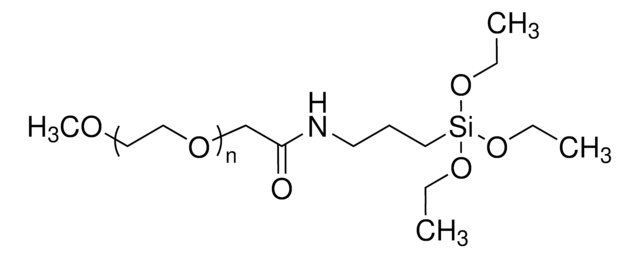
![(1R,8S,9s)-Bicyclo[6.1.0]non-4-yn-9-ylmethyl N-succinimidyl carbonate for Copper-free Click Chemistry](/deepweb/assets/sigmaaldrich/product/structures/969/022/d6776082-2f7a-47c7-bcd4-3830dac0fb7d/640/d6776082-2f7a-47c7-bcd4-3830dac0fb7d.png)
